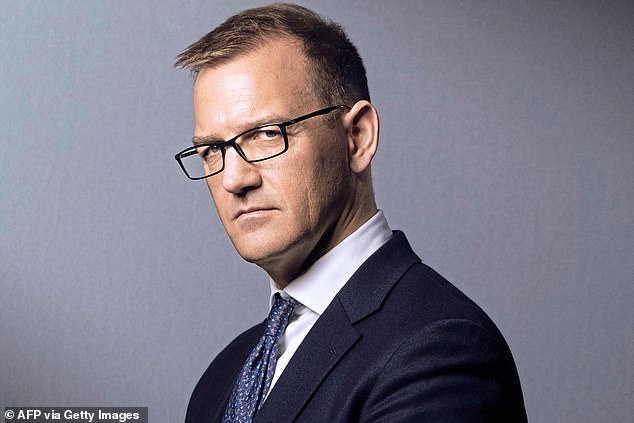Table of Contents
Europe has done a fantastic job weaning itself off Russian gas supplies since the start of the Ukraine war.
The Kremlin’s share of the gas market has plummeted from 35 percent to 8 percent as users switched suppliers to Norway and liquefied natural gas (LNG) producers in Qatar and the United States.
There has been a major leak, which is the transit of gas through Ukraine, mainly to Slovakia and Austria.
That agreement came to an end on January 1 when Ukraine’s Naftogaz refused to renew its last five-year transit deal with Russia’s Gazprom.
The mystery is why, given extensive Western sanctions against Russia, this contract remained in place.
The policy was seen as an economic benefit for kyiv, which loses around £800m in transit fares due to the cut. Less discussed are the other beneficiaries.
Links to Russia: Royal Mail bidder Daniel Kretinsky has 49% stake in Eustream pipeline pumping gas to Slovakia via company EPH
These include SPP Infrastructure, the group that controls the Eustream pipeline that pumps gas to Slovakia.
The minority 49 per cent owner in the pipeline is EPH, part of Czech sphinx Daniel Kretinsky’s growing empire, which includes stakes in West Ham FC and Sainsbury’s.
Putin’s gas has enriched Kretinsky and his associates, and is one of the reasons why Kretinsky has been able to accumulate enough wealth to allow him to make a £3.6bn bid for International Distribution Services, owner of Royal Mail.
The Slovakia/Austria pipeline has been able to operate thanks to an EU exemption.
This does not alter the fact that Russia’s horrific war against Ukraine has escalated using drones and advanced rockets to attack civilian and power generation targets.
The assault has cost lives in the war-stricken country.
Kretinsky and his fellow infrastructure investors have continued to receive dividends from the pipeline, so it is extraordinary how the proposed Royal Mail deal was approved under the National Security and Investment Act in such circumstances.
The United Kingdom was at the center of the effort to hinder the Russian economy, expelling UK-based oligarchs from the country, seizing billions of pounds in financial assets, ending Russian stock listings in London, and much more. further.
Even if kyiv were the intended beneficiary of keeping the trans-Ukrainian line open, it would be difficult to justify profiting from the Russian connection.
Business Secretary Jonathan Reynolds and the Royal Mail unions may regard Kretinsky as a legitimate businessman, but the families of the dead, injured and dispossessed in Ukraine may have a different opinion. The British Government should do the same.
Export pain
The economic outlook is not improving for Rachel Reeves.
Growth could get a boost in 2025 thanks to cash flowing into the public sector after its budget.
But wealth creation through the private sector is neglected. And with the Government absorbing much of the country’s borrowing capacity, there is a risk that private sector investment will be crowded out.
The manufacturing Purchasing Managers’ Index continues to tell a dismal story, with activity contracting at the fastest pace in 11 months.
The United Kingdom tends to mock the weakness of the eurozone economies, but that ignores the fact that Europe is Britain’s largest trading partner.
This has contributed to the biggest drop in exports and new orders in ten months.
Normally, Britain can count on its dominant services sector and the City to bail us out. There is no better time for the Chancellor to boost confidence by helping to forge a new “equivalence” deal for the London derivatives market.
Equally critical, lifting stamp duty on share trading could be totemic in reviving morale in the UK’s battered stock markets.
Space science
Britain punches above its weight in science, as evidenced by the UK’s track record in Nobel Prizes and tech startups.
It is deeply worrying that Financial Times analysis reveals a decline in core science subjects over the past five years. University chemistry courses have plummeted by 25 percent and biosciences by 15 percent.
Education spending is proposed to rise by £2.3bn over two years, with money coming from VAT on independent education. This would best be implemented by revitalizing the appetite for technological and laboratory training.
Ministers must close the scientific gap if the research advantage is not to be weakened.
DIY INVESTMENT PLATFORMS

AJ Bell

AJ Bell
Easy investing and ready-to-use portfolios

Hargreaves Lansdown

Hargreaves Lansdown
Free Fund Trading and Investment Ideas

interactive inverter

interactive inverter
Fixed fee investing from £4.99 per month

sax

sax
Get £200 back in trading fees

Trade 212

Trade 212
Free trading and no account commission
Affiliate links: If you purchase a This is Money product you may earn a commission. These offers are chosen by our editorial team as we think they are worth highlighting. This does not affect our editorial independence.


